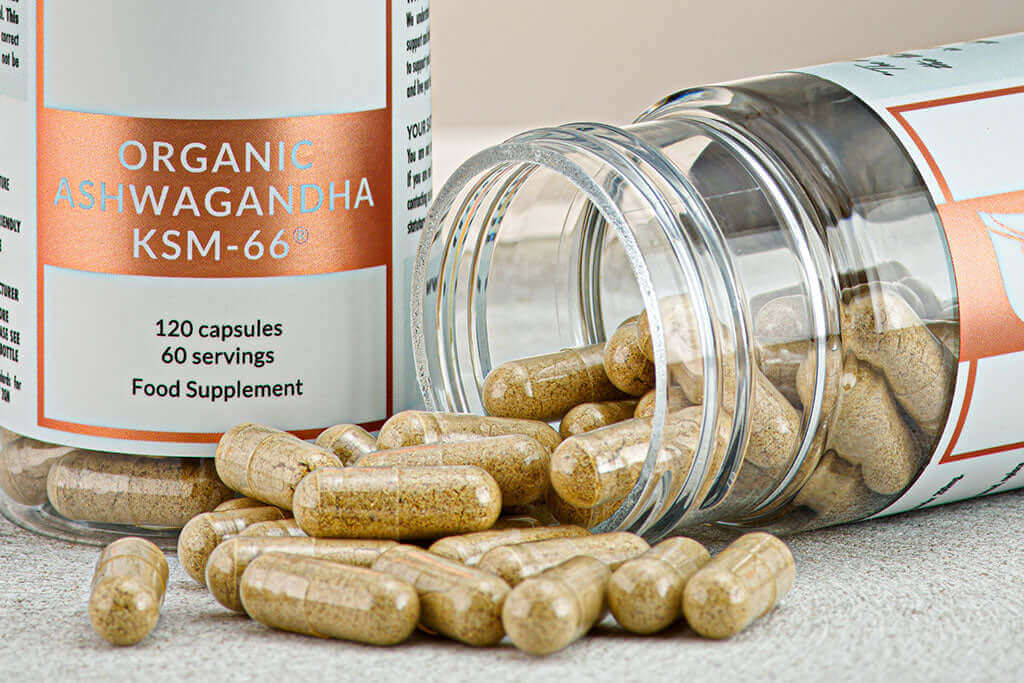The Top 10 Benefits of Ashwagandha


Ashwagandha is widely used to help support wellbeing and a healthy and balanced lifestyle. Also known as Indian Ginseng or Withania Somnifera, Ashwagandha is an adaptogenic herb that is proven to support mind-body health.
It’s origins lie in Ayurveda, a medicinal and health lifestyle which was developed thousands of years ago by the sages of India.
Ashwagandha has been used in the Indian Ayurveda herbal medicinal system for thousands of years. More recently, it’s use has become much more widespread. For more information on Ashwagandha please read our blog Ashwagandha: What is Ashwagandha.
To help define the many positive ways Ashwagandha can impact our health and wellbeing, we have researched the top 10 benefits of Ashwagandha.
1. It helps to reduce anxiety and stress
Stress reduction is the primary benefit that Ashwagandha is known for; its ability to reduce stress is widely accepted.
Human studies have demonstrated that it has effectively reduced symptoms for people who suffer with stress or anxiety disorders. Researchers have looked at the effects on the brain and they reported that taking Ashwagandha blocked the ‘stress pathway’.
In a 60 day study of 64 people with chronic stress, those taking Ashwagandha reported a 69% average reduction in anxiety and insomnia. Those in the placebo group reported only an 11% reduction.
In a further study, 88% of people who took Ashwagandha over an 8 week period reported a reduction in anxiety. In this instance only 50% of those who the placebo reported the same.
2. Supports a reduction in Cortisol levels in the body
Our Adrenal Glands release ‘Cortisol’ in response to stress and when our blood sugar gets too low. Cortisol is therefore often referred to as ‘the stress hormone’.
Chronically elevated Cortisol levels can result in high blood sugar as well as increased storage of fat in the abdomen.
It has been shown in studies that Ashwagandha supplements may help in reducing the Cortisol levels of people who suffer chronic stress.
Chronically stressed adults participated in a study of the effects of Ashwagandha on Cortisol levels. Those who were given the highest dose of Ashwagandha supplement had a 30% reduction (average) in their Cortisol levels.
All groups taking Ashwagandha showed a reduction in Cortisol in comparison to a control group taking none of the supplement.
3. Reduction in the symptoms of Depression
There is limited research available that suggests that Ashwagandha can help in reducing the symptoms of severe depression.
Adults that took 600mg of Ashwagandha per day, over a 60 day period, reported a 79% reduction in the symptoms of their depression. Interestingly, the group that took the placebo supplement reported a 10% increase in their symptoms.
4. Lowering inflammation in the body
Human studies have been able to show that Ashwagandha can help increase the production of the immune cells in our bodies that help to fight infection and keep us in good health.
These studies also showed a decrease in the markers of inflammation, such as CRP (C-Reactive Protein). This marker is closely linked to an increased risk of heart disease.
For example, in a research study, one group took 250g of Ashwagandha daily and one group took a placebo. The CRP of those who took the real supplement reduced by 36% on average, whilst the reduction in the group taking the placebo was only 6%.
5. Supports improvement cognitive function and memory
Laboratory studies suggest that Ashwagandha can be effective in reducing the problems in memory and brain function caused by both injury and disease.
The studies demonstrated that Ashwagandha protects nerve cells from harmful free radicals by promoting antioxidant activity.
In Ayurvedic practice, Ashwagandha has traditionally been used to boost memory. However, there is currently only a small amount of human research in this area.
A good example, however, comes from a controlled study where healthy men were given 500mg of Ashwagandha each day. The results showed significant improvements in their reaction time and task performance, compared to men who received a placebo.
6. Possible effect in lowering Cholesterol and Triglycerides
Ashwagandha may help to improve the health of our hearts. Studies have shown that as well as having anti-inflammatory effects, it may promote the good health of our most vital organ by reducing cholesterol and triglyceride levels.
One laboratory study found that total cholesterol was reduced by as 53% and triglycerides by nearly 45%.
Limited further human studies have replicated this with slightly less dramatic results, but have still shown significant improvement in these measurements.
A group of adults suffering chronic stress were given an Ashwagandha supplement over a 60 day period. Those that took the highest dose showed a 17% decrease in LDL cholesterol, and an 11% decrease in triglycerides (average).

7. Helping reduce blood sugar levels
Through test tube studies, it has been found that Ashwagandha increased insulin secretion and improved insulin sensitivity.
Human studies that followed this have further confirmed the possible ability of this supplement to lower the blood sugar levels in people with diabetes, as well as those without it.
During a small study of just 6 people who suffer type 2 diabetes, it was found that using an Ashwagandha supplement for 30 days resulted in blood sugar being lowered as effectively as if they had used an oral diabetes medication.
This needs much more in depth research, but this result is potentially very positive.
8. May help to increase strength and muscle mass
Ashwagandha may help to increase strength and improve body composition according to some research studies that have been conducted.
In a study to establish the safest and most effective dose for the herbal supplement, healthy men took between 750-1250mg of Ashwagandha per day for 30 days. The men all gained muscle mass and lost fat during this period.
In a further study, those taking the Ashwagandha supplement (rather than the comparative placebo) showed significantly greater gain in muscle strength over the period of the study. They also showed double the reduction in body fat percentage compared to the placebo group.
9. Properties that are considered to be ‘anti-cancer’
Apoptosis is also known as ‘programmed cell death’ and is often used in terms of cancer cells.
Laboratory studies have shown that Ashwagandha helps to promote apoptosis, as well as impeding the growth of further new cancer cells.
There are not any human studies to confirm these results are as effective outside the laboratory as yet. However, the research so far is encouraging.
10. Helping to increase male fertility and boost Testosterone
Studies have shown that Ashwagandha supplements may have a powerful effect on hormone levels and reproductive health in men.
A study measured the sperm count of infertile men. Those that were treated using the Ashwagandha supplement showed an increase in both sperm count and sperm mobility. It also led to a significant increase in their testosterone levels.
A further study primarily measured how Ashwagandha can help with stress. As a unexpected result, men who received the Ashwagandha over a 3 month period experienced higher antioxidant levels and better sperm quality.

In conclusion, we can really see that Ashwagandha is a traditional Ayurvedic herb with many health benefits that can support your overall wellbeing and lifestyle.
It can help to reduce anxiety and stress, support in fighting the symptoms of depression, potentially boost fertility and testosterone in men, and may even boost brain function and muscle mass.
Ashwagandha Supplements may be an easy and effective way to improve your health, wellbeing and quality of life. If you think that you will benefit from improving your wellbeing in some of the above ways, then it’s time to try Ashwagandha. Empower Your Wellbeing.

P.S. Enjoyed our blog? You may like to take a look at our others:
YOGA: Stress, Life and The Benefits of Yoga
MEDITATION: The Top 5 Benefits and Why It Will Help YOU!
















